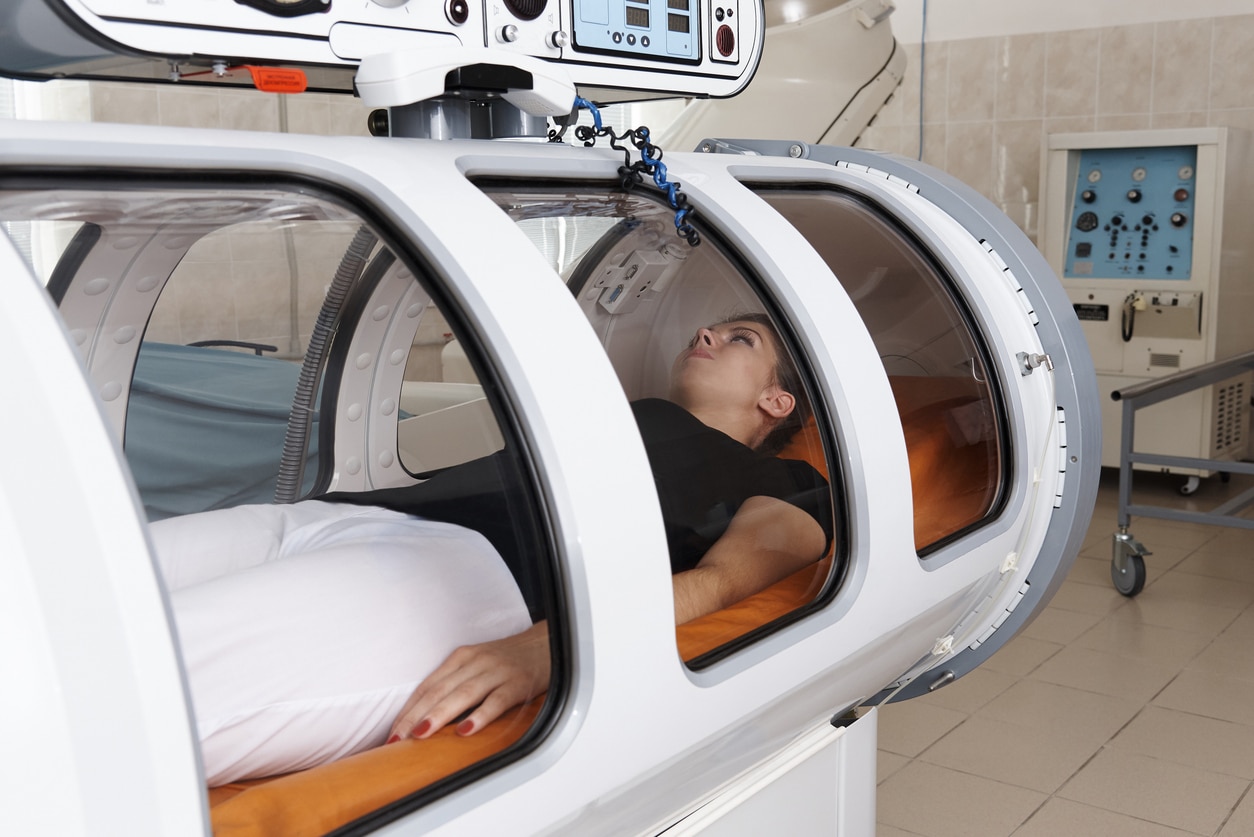Winter is cold and flu season. During this time, you may be looking for ways to boost your immunity, especially if you are immunocompromised due to certain health conditions. One way to do this is through Hyperbaric Oxygen Therapy (HBOT). UAB Medical West uses this innovative treatment in a variety of ways, ranging from chronic wound care to simply improving immune function. Below, we discuss this treatment and how it can benefit you and your specific condition.
What is Hyperbaric Oxygen Therapy?
During Hyperbaric Oxygen Therapy, a patient breathes pure oxygen in a pressurized environment that is double or triple that of normal air pressure. It is commonly used to treat chronic wounds caused by conditions like diabetes, severe anemia, and serious infections. The oxygen helps fight bacteria while also triggering the release of growth factors and stem cells, which promotes healing and new blood vessel formation. For most patients, daily treatments are required to achieve healing and take around two hours each. Your doctor can help you determine the ideal treatment schedule.
What Are Some Conditions That Hyperbaric Oxygen Therapy Can Treat?
Hyperbaric Oxygen Therapy can be used to treat a variety of wounds resulting from the following conditions, among others. Your doctor can help you determine if your condition could benefit from this treatment.
Anemia
In severe cases of anemia, hyperbaric oxygen therapy has been proven to be an effective treatment that increases oxygen delivery to the tissues, thus correcting oxygen debt. It can be an alternative to blood transfusions for patients who cannot have them due to medical or religious reasons.
Arterial Gas Embolism
Poor blood flow to vital organs can result in serious complications. This can be caused by a condition known as arterial gas embolism, which results from air bubbles in the blood vessels. HBOT shrinks these bubbles, improving blood flow. This condition can also present as part of decompression sickness, which can occur with scuba divers and others who work in pressurized environments.
Burns
Depending on the type of burn, a wound can be left behind, slowing the healing process. Burns also cause swelling, which slows down the wound healing process. By reducing swelling and providing significantly increased levels of oxygen, HBOT can help you recover from severe burns.
Brain Abscess
When bacteria or fungi infect brain tissue, it can sometimes result in a brain abscess. If not treated promptly, this pus-filled swelling can be potentially life-threatening. HBOT increases oxygen levels in the brain and fights the infection. It can be used alongside other treatments, including surgery and antibiotics.
Carbon Monoxide Poisoning
Carbon monoxide poisoning results from exposure to carbon monoxide, an odorless, colorless gas that comes from burning fuel like propane or wood. This condition can be potentially fatal if not treated quickly. Exposure to oxygen, like in HBOT, can be effective in treating this condition by preventing potential heart and brain tissue damage resulting from more severe cases of carbon monoxide poisoning.
Chronic Wounds
One of the most common uses for HBOT is to heal chronic wounds due to diabetes. Diabetes, along with several other conditions, can affect how your body heals from injuries. Treating these wounds with Hyperbaric Oxygen Therapy can help them heal faster by regrowing small blood vessels that have died off due to the disease, as well as providing increased oxygenation to the tissues, which will help prescribed antibiotics fight infection.
Radiation Injuries
Another very common issue treated with HBOT is chronic radiation injuries. These can range from a non-healing skin wound at the site of radiation to internal tissue damage to the bladder, colon, or bone around the site of radiation. Internal tissue damage due to radiation is often found when you experience bleeding or increased pain in those sites.
HBOT is the only known treatment that helps reverse radiation damage by regrowing blood vessels that were destroyed during radiation treatment, thus reestablishing blood supply to these tissues. A history of radiation to the head and neck can increase the risk of bone loss with needed dental work in the future. Having HBOT prior to tooth extraction, for example, can help decrease the risk of bone loss.
Hearing & Vision Loss
HBOT can potentially be beneficial in some cases of sudden vision or hearing loss. By increasing the amount of oxygen in the affected areas and reducing inflammation, HBOT can prevent further hearing or vision loss.
How Long Does Hyperbaric Oxygen Therapy Last?
As with other therapies, your treatment timeline with HBOT may vary depending on your condition. While some patients experience the effects immediately, it may take several sessions for others. For our most commonly treated conditions, patients typically require 30-60 sessions for blood vessels to regrow and infection to clear. Your doctor can discuss specific timeframes and expected results with you during your initial consultation. To learn more about HBOT or to schedule an appointment, contact UAB Medical West.
Explore Your Treatment Options at UAB Medical West
Regardless of your needs, UAB Medical West can help you find the treatment you need to heal. We offer a variety of options, including Hyperbaric Oxygen Therapy, to best meet our patients’ needs. To learn more, contact us to schedule an initial consultation with one of our specialists.
Get Hyperbaric Oxygen Therapy at UAB Medical West
When suffering from chronic wounds, an autoimmune disorder, or other conditions, you want fast, effective healing. We can help you explore your options, including Hyperbaric Oxygen Therapy. For more information or to schedule an appointment at the Advanced Wound Clinic, please contact us at (205) 481-8790.
